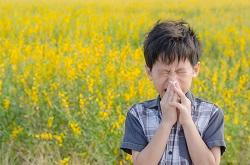
From seasonal allergies to food allergies, find out how to keep your child healthy and happy.
Does a day of playing outside leave your child coughing, sneezing, and dealing with watery eyes? Do certain foods have your child grabbing their stomach in pain or make them feel nauseous? With millions of children dealing with at least one allergy, our Commack, NY, pediatric pulmonologist Dr. Brian Bezack wants parents to know the warning signs of an allergy, how to treat the problem and when to see a doctor.
What are the symptoms of childhood allergies?
The symptoms usually depend on the type of allergy your child is dealing with. Common symptoms include:
- Sneezing
- Coughing
- Wheezing (a whistling sound when breathing in and out)
- Difficulty breathing or throat tightness
- Itchy skin
- Hives (an itchy rash that causes raised welts to form)
- Swelling
- Itchy, red or water eyes
- Stomachache or bloating
- Diarrhea
- Vomiting
What are some common allergies in children?
Common allergic triggers include:
- Dust mites
- Pollen
- Mold
- Pet dander
- Cockroaches
- Certain foods (e.g. cow’s milk, eggs, shellfish, peanuts)
- Latex
- Medications
When should my child see a pulmonologist?
If your child is experiencing symptoms of an allergy, if symptoms are affecting their daily routine or if they are having trouble breathing it’s important that you see a doctor right away. Our pulmonologist has received additional years of training in pediatric medicine to be able to diagnose and treat allergies and other respiratory problems in children and tens.
How are childhood allergies treated?
The treatment plan that our Commack, NY, children’s pulmonologist will map out for your child will depend on the type and severity of the allergy. The plan will often include a mix of medication and lifestyle modifications. Lifestyle changes can have a profound impact on your child’s ability to manage symptoms. These changes include:
- Keeping doors and windows closed on high pollen days
- Avoiding the outdoors on days with high pollen or ragweed counts
- Taking clothes off immediately and washing them after being outside
- Bathing pets at least once a week
- Keeping all furniture, carpeting and surfaces clean
- Making bedrooms pet-free zones
- Avoiding foods that may trigger allergic responses
Children with minor allergies may be able to cope through these simple lifestyle modifications and over-the-counter antihistamines. Children with more moderate-to-severe allergy symptoms will often require prescription antihistamines or steroid nasal sprays, as well as making these lifestyle changes. Children with severe or potentially dangerous allergies may carry around an EpiPen in case of anaphylaxis.
If you are worried that your child might have asthma or allergies then call Bezack Pediatric Pulmonology in Commack, NY, today to schedule an appointment. We can help your little one breathe easier.
